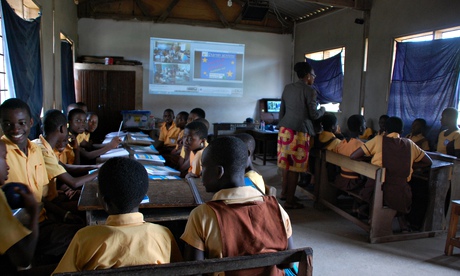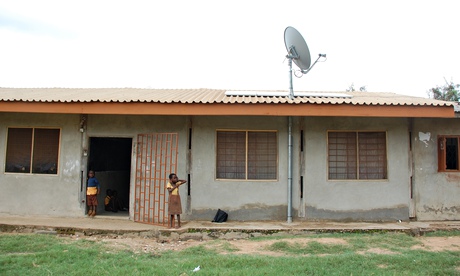Education
Source: The Guardian
In two classrooms in Ghana's Greater Accra region, solar-powered computers project animated videos broadcast live by satellite on to walls. Pupils at Mataheko primary school are taking part in a lesson in addition and subtraction based on the price of Spider-Man rucksacks and of dresses, and reciting songs about skiing for verb practice.
The project is an attempt to improve the fortunes of girls, who are quitting school early and underachieving in disproportionate numbers. The high dropout rates are caused by a variety of factors: child marriages and teenage pregnancies are common, and, in communities where polygamy is the norm, large numbers of children to feed and educate within single families often means that girls are expected to earn supplementary income.
While children in other classes at the school are being taught by rote, using well-thumbed textbooks, the youngsters in these two maths and English classes are being led in activity-based lessons by teachers in studios in the capital, Accra. Each class has a facilitator – the local teacher, who is physically present in the classroom, fielding the microphone for the occasions on which pupils in their group are chosen to answer questions, and making sure children are keeping up with the pace the studio is setting.
Mataheko is one of 72 schools piloting the £3m interactive distance-learning project – the first in Ghana – designed to boost educational attainment, manage the quality of teaching and help cut teacher absenteeism.
The project, MGCubed (Making Ghanaian Girls Great), is being rolled out by Gems Education Solutions a UK consultancy funded by Britain's Department for International Development (DfID) as part of its Girls' Education Challenge (GEC), which aims to help a million of the world's poorest girls improve their lives through education. The Gems programme plans to reach 8,000 children.
In the studio, teachers enunciate like gameshow hosts, as their lessons are broadcast to a number of classes. Each class consists of about 40 girls and boys – though the project is aimed at girls, classes are mixed – and is part of a regional cluster in which the teachers in Accra can speak to the children in English as well as in their local language.
Despite gross enrolment rates in Ghana's 22,000 primary schools having steadily increased in recent years – in 2013, the enrolment rate reached 87%, – a high proportion of students fail to attain basic competency in core subjects.
"Since the MDGs [millennium development goals] wave one, there are very clear charts where you see enrolment levels going up and ... national exam results going down, so there's been a clear trade-off between getting enormous [numbers of] bums on seats and crowding," says Gordon Carver, the project director of MGCubed.
"I think the next 15-20 years for education in sub-Saharan Africa is all about quality and improvement. This model is just one of many different interventions trying to tackle that issue."
Carver also hopes that a byproduct of the MGCubed model will be its teaching methods finding their way to other classes and to those of other teachers in the school. As opposed to learning by rote, children are encouraged to participate more. Studio teacher Shine Dewovo, who undertook the profession for three years before joining Gems, sums it up: "Instead of spoon-feeding children, we are leaving them to generate ideas and derive their own questions."

Dewovo also says the project helps to improve attainment by tracking teacher absenteeism, as the local teachers are required to appear in a studio in the capital every day via webcam. "You always have to be present because someone is watching," she says.
Teacher absenteeism is a big problem in Ghana, especially in rural areas. In March, the president, John Dramani Mahama, promised to tackle the problem. However, during the rainy season, roads can become impassable and teachers – who often don't live locally – struggle to travel.
Money for the project is coming from the "innovation" bracket of DfID's GEC fund, which has allocated almost £30m to 19 innovative projects in 12 countries, led by the private sector. DfID has not been shy about its desire to get the private sector more involved in development, although that is not without controversy. According to the Gems chief executive, Chris Kirk, DfID has structured the funding "on basis of payment by results ... We will only make a profit from the programme if we exceed on the targets that we've been set."
Speaking at the launch of the project this month, Charlotte Pierre, deputy director of DfID Ghana, stressed that the money was "not a free gift", and called on teachers, students and community members to play their parts in ensuring its success, but defended the involvement of the private sector. "When you are working through a smaller partner, like a private company like Gems ... the potential for innovation and for being more agile [is a benefit]," she said.
For Mark Rosenberg, from Alleutia, a UK company that manufactures the solar computers for the project, "these lessons are making education personal over long distances". At the project's launch, he desribed it as a "brave and bold experiment; we should acknowledge the potential for the continent as a whole".
But some aspects of teaching cannot be replicated by distance learning. Asked what she misses about being physically present in a classroom, Dewovo says: "Getting to hear the kids' jokes."

